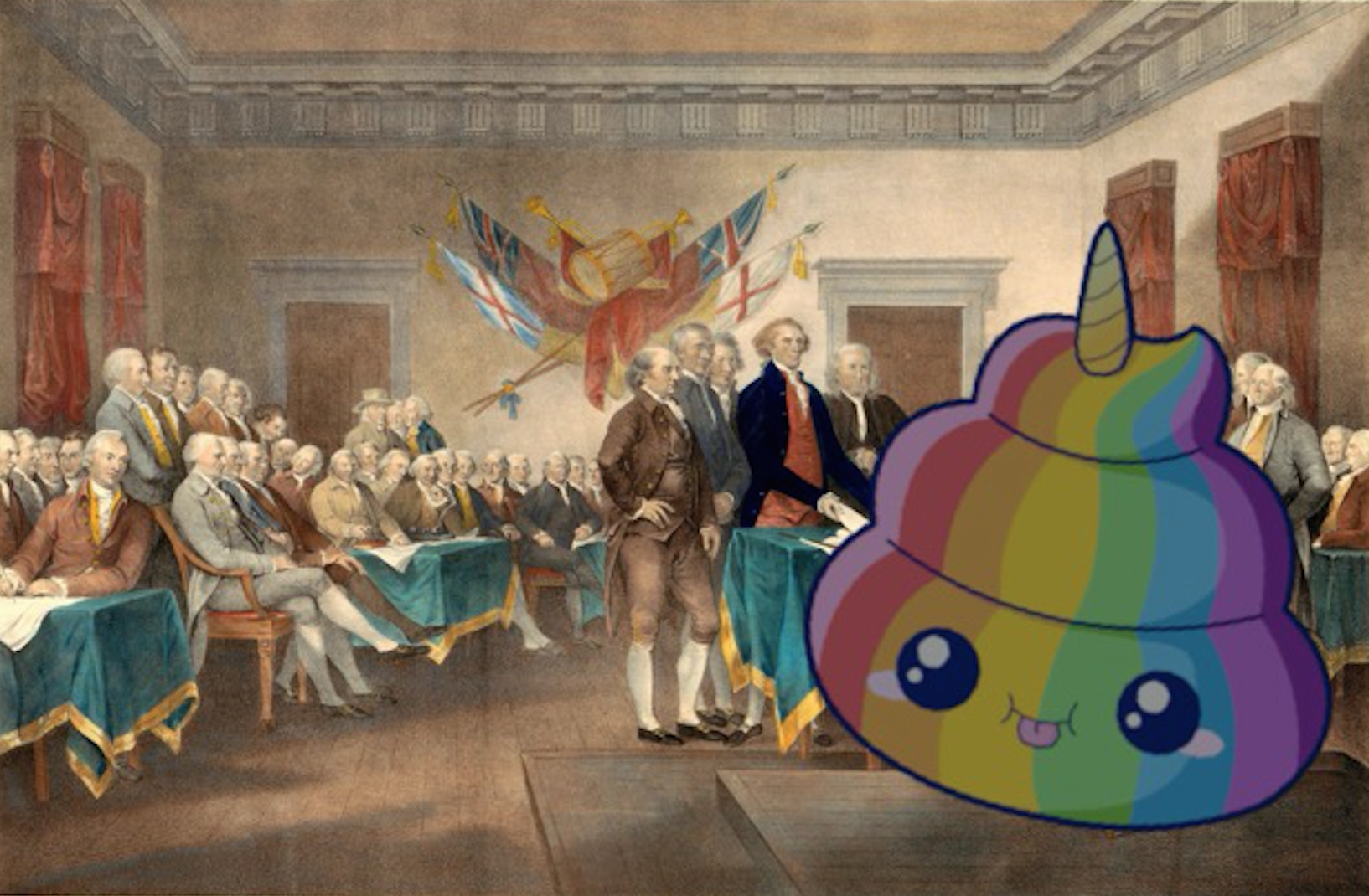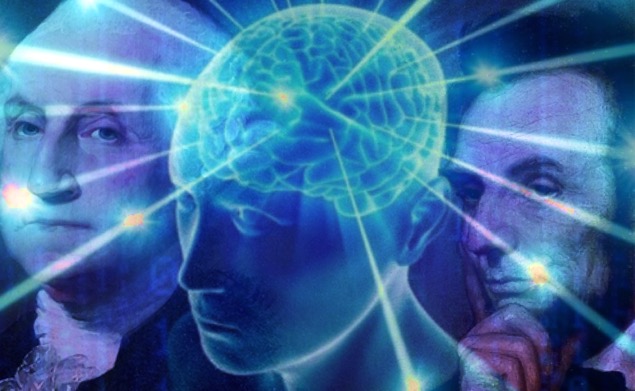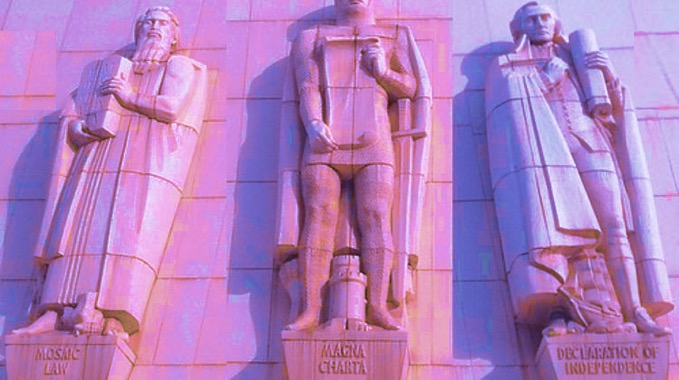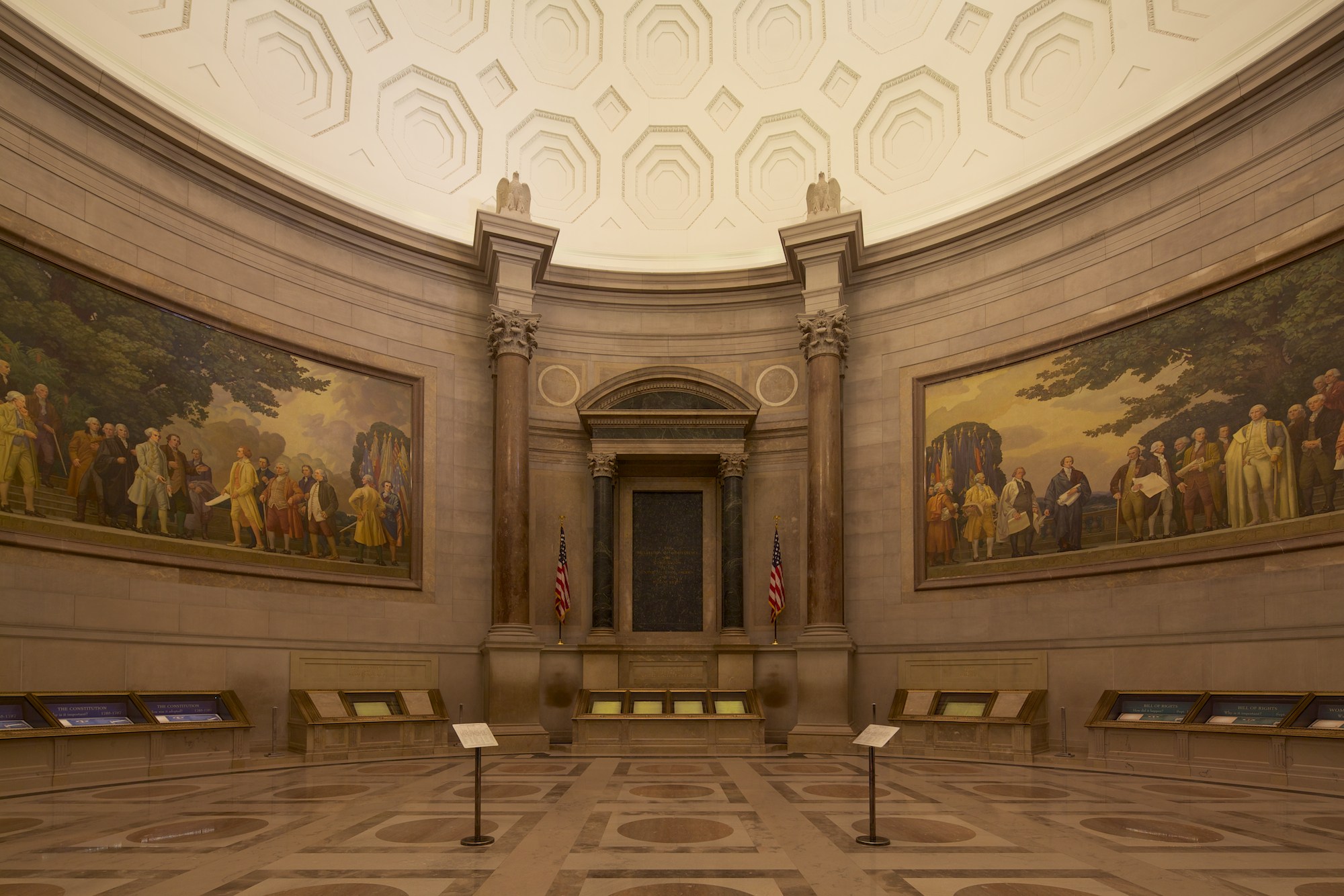Today's fights on the Right benefit old wisdom and new thinking alike.
The American Founding Was Not Libertarian Liberalism

The New Right renews Americanism.
The debate between Sohrab Ahmari and David French is not about Sohrab Ahmari and David French. Nor is it merely a debate within the Right over the ferocity and tone with which it ought to oppose the Left. At root, this is nothing less than a debate over the future of “conservatism” and the American Right. More specifically, it is a debate over the role of “libertarian” or “liberal” ideology on the American Right—a specific set of ideas that are, unbeknownst to many conservatives, contradictory to the principles and purposes of the American founding itself.
The sudden ferocity of this debate reveals that people on all sides sense it involves underlying issues of importance, and are itching to engage each other. In the article that launched 1,000 think pieces, Ahmari said we must “fight the culture war with the aim of defeating the enemy and enjoying the spoils in the form of a public square re-ordered to the common good and ultimately the Highest Good.” For this, Charles Cooke, the editor of National Review Online, called Ahmari a “Leninist.”
Remarkably, to speak explicitly of the common good—never mind justice—as the end and purpose of government makes many of today’s conservatives nervous, if not queasy, perhaps in large part because of how, over the last century, the Left has appropriated the words that traditionally signified the purpose of government. Abandoning the language of Western tradition to describe the purpose of government has grievously weakened the Right, helping habituate it to playing the role of a losing army engaged in long retreat.
But many on the Right have done more than shrink from using the classic words of the Western world. For a variety of reasons, not least of which is ignorance, significant elements of the old coalition have gradually abandoned the foundational political thought of the Western tradition—and the American founding itself. Ahmari and the coalescing New Right do not represent new members of the coalition, but re-present traditional arguments and ideas that have been too long forgotten. The New Right does not argue for anything new, but is refocusing and reordering the priorities of the Right on what is now most needful. In order to reform itself and build a new foundation in the age of Trump, conservatives must reevaluate their “libertarianism” or “liberalism,” concepts which have metastasized and become harmful ideologies masquerading as traditional principles.
I signed a statement in March entitled “Against the Dead Consensus” with Ahmari, which asserted that “even during the Cold War, this conservatism too often tracked the same lodestar liberalism did—namely, individual autonomy. The fetishizing of autonomy paradoxically yielded the very tyranny that consensus conservatives claim most to detest.” There is perhaps no greater example than when Justice Anthony Kennedy, “while upholding the constitutional ‘right’ to abortion,” as we said in our statement, asserted in Planned Parenthood v. Casey that “[a]t the heart of liberty is the right to define one’s own concept of existence, of meaning, of the universe and the mystery of human life.”
Conservatives ostensibly oppose this notion and often revile this sentence, buoyed by the understanding that it was employed to prevent states from passing laws thwarting the extermination of the unborn. But it is a telling definition because it serves as a neat distillation of decades of rhetoric and political action (or the lack of it) on the American Left and Right. It encapsulates the worst of the baby boomers when confronted with the thorniest of political issues. It sums up their solipsistic platitudes of self-help that still dominate our culture and obscure the very existence of the higher goods every human being must seek out in order to achieve a fulfilling measure of happiness.
There is in fact no greater example of the artful dodging of autonomous individualism—and a line that might wrongly resonate with many leaders on the Right today—than the Court’s opinion in Casey that its “obligation is to define liberty for all, not to mandate our own moral code.” But, of course, a moral code based on their understanding of human nature is precisely what they mandated. To define liberty is to define morality, for to define liberty is to define what is permitted and therefore deemed good or neutral and what is not permitted and thereby deemed evil or dangerous.
Outside of the regnant ignorance of many of our “elite” leaders on all sides over the last decades, millennia of western civilization speak loudly and clearly: all law is—or is based upon—a moral code. That the highest court in the land could offer up such inanities reveals that in some very serious way we have broken with that tradition. What have we become? We need a clear-eyed and agreed upon understanding about whatever ideology seems to guide us now, even if we disagree about how and why we got here.
The American Right and Libertarian Liberalism
As the political landscapes shift in the Trump era, amidst the dizzying confusion of yawning realignment, words like “libertarianism” and “liberalism” do not help us clarify matters. We must avoid equivocation and define our terms. Our old words do not accurately describe a newly unveiled world full of strange new gods.
When the emerging New Right refers to “liberalism” and “libertarianism” negatively, it refers to the idea among many mainstream Right-leaning leaders that the goal of government is not to achieve a national common good beyond individual material prosperity and the bodily satisfaction of individuals. Above all, the New Right rejects the notion that the purpose of government is morally neutral, or merely to give autonomous individuals the freedom to do whatever they wish.
Let us call what the New Right rejects “libertarian liberalism.”
When we oppose “libertarianism,” we do not primarily refer to those who explicitly call themselves “libertarians,” even if we disagree with libertarians profoundly about the role of liberty, morality, economics, and government and the relationship between them. In fact, the New Right might have reason to work politically with those who call themselves libertarians on overly interventionist foreign policy, the danger and unintended negative consequences of government overreach, the importance of constitutionalism vs. arbitrary rule, and the tyranny of the administrative state and the class of ill-educated “experts” who now govern America.
What “liberalism” means today is more complicated and varied. There is no rising coalition rejecting democratic republicanism as a valid form of government while simultaneously throwing out the entire concept of individual rights (although younger members of the Right and Left increasingly dispute the efficacy of both). But among those who speak of “liberalism” negatively, there is unifying and serious disagreement with a notion that arose among progressives in the West over the last century: namely, that the purpose of government is to discover, dispense, and protect an ever-expanding catalogue of individual rights primarily for economic purposes. Whatever its ultimate origins or widest meaning, “liberalism” used negatively stands for the idea that the overriding purpose of government is the continual promotion of individual freedom over and against what were formerly considered moral and material constraints, and that this endless movement constitutes “progress.”
Thus, the combination of the libertarian notion of the role of liberty, morality, and government with liberalism, or liberalism severed from the deeper classical and Christian political thought, is what the New Right stands against. The libertarian liberal intellectual framework currently prevents conservatives of good will from rethinking and reexamining their political strategy and policy stances—concepts in dire need of recalibration if they wish to respond wisely to radically different circumstances in the age of Trump. Lamentably, too many understand the original principles and purposes of American government itself in terms of libertarian liberalism. After all, is not the purpose of America “liberty for all,” as opposed to the rise in the last century of an unaccountable administrative state, and is not this maxim a unifying antidote to the tyrannical urges of the Left?
The American Founding Rejected Libertarian-Liberalism
Whatever their flaws, the founding generations who created and designed the original form of the United States of America roundly and explicitly rejected libertarian-liberalism.
We do not now live in the same regime our Founders wrought. As the Claremont Institute has long argued, elite and educated society began to roundly and explicitly reject the thought of the American Founders in the late 19th century. And during the early part of the 20th century, this intellectual rejection was legislated into being by enormously influential political leaders such as Woodrow Wilson, inexorably changing—for the worse—the course of our political and cultural life.
During the same time period, scholars (often historicists and watered-down Marxists) increasingly downplayed the role of ideas in human life, rejected the concept of morality and order in nature, and embraced a strict materialist view of human beings and their affairs. Accordingly, they proffered a revisionist history of the Founding. They ripped documents and quotes out of context (such as Federalist 10 and 51, which had never before been given such weight) to assert the Founding was merely about economic self-interest, and the Constitution amounted to an amoral, outdated, clunky 18th century contraption of checks and balances.
Scholars, those all-too-human beings, treat the American Founding as a Rorschach test for whatever they find wrong (or right) with American life in the era within which live. As the 20th century wore on, especially post-World War II, intellectuals on the Left who found much to despise in American life began to decry consumerism, the notion of individual property rights, and everything else they didn’t like in contemporary politics as a baleful product of the “Lockean individualism” of the founding generations. But scholars on the Right who opposed them often accepted their premises, arguing instead that such notions were positive goods, leading to America’s success.
The result is that many on the Left and Right today wrongly think that the American Founding was a product of libertarian liberalism.
Liberty Versus Licentiousness
For the founding generation, however, liberty was defined and limited by the higher purposes of human life. As Federalist 51 famously proclaimed in 1788, arguing for the acceptance of the Constitution of the United States of America:
Justice is the end of government. It is the end of civil society. It ever has been and ever will be pursued until it be obtained, or until liberty be lost in the pursuit.
Even at the birth of the western republics that still lead the world, which often call themselves democracies and for which liberty has always been considered a constituent part of political justice, America acknowledged that justice, not liberty or freedom, was the ultimate purpose of human governance. Justice refers to the right way to order ourselves and our relationships with others so as to achieve what is truly good for all of us together. Freedom itself had be justified by means of argument about its purpose, and whether or not it was conducive to the common good of all.
The preamble to the U.S. Constitution refers last in its list of purposes to securing the “Blessings of Liberty.” The suggestion that this meant autonomous individualism as the Supreme Court defined it in Casey is absurd. Official documents such as the Virginia Bill of Rights of 1776 make crystal clear what the phrase meant to the founding generations: “…no free government, or the blessings of liberty, can be preserved to any people, but by a firm adherence to justice, moderation, temperance, frugality, and virtue, and by a frequent recurrence to fundamental principles.” Liberty’s blessings, in other words, require virtue, or certain salutary habits of behavior—well defined by both reason and revelation in Western tradition—in order to enjoy and exercise them.
One of the central arguments for the passage of the Constitution was to promote this form of liberty consonant with classical and Christian virtues over and against licentiousness. As Noah Webster defined it in the first American dictionary in 1806, “Licentiousness” referred to the “contempt of just restraint,” i.e., freedom unrestrained by, and therefore in, opposition to justice.
This distinction was embedded deep in American political thought from the start. Even as the Constitution of the State of New York protected “the free exercise and enjoyment of religious profession and worship, without discrimination or preference,” in 1777, for instance, it qualified this freedom, “[p]rovided that the liberty of conscience hereby granted, shall not be so construed, as to excuse acts of licentiousness, or justify practices inconsistent with the peace or safety of this State.” A century later, over and against arguments based on the principle of religious liberty, the American political system had little hesitation enforcing laws against the Mormon practice of bigamy.
When George Washington argued that stronger governmental unity between the states was needed in his Circular to the States in 1783, he warned that “arbitrary power is most easily established on the ruins of liberty abused to licentiousness.” The sentiment ultimately became part and parcel of the argument for the adoption of the Constitution of the United States. Benjamin Rush echoed the rest of the Federalists in 1787 when he said:
In our opposition to monarchy, we forgot that the temple of tyranny has two doors. We bolted one of them by proper restraints; but we left the other open, by neglecting to guard against the effects of our own ignorance and licentiousness. Most of the present difficulties of this country arise from the weakness and other defects of our governments.
In designing and supporting the Constitution, the Federalists thus supported the federal centralization of power—especially over commercial activity—in moral terms, for moral reasons (see the section on “Lincoln and the Founders” here). Like the rest of the Federalists, when Oliver Ellsworth argued for the adoption of the Constitution with economic policy in mind, he called opposition in the name of freedom to the new centralized government licentious:
Liberty is a word which, according as it is used, comprehends the most good and the most evil of any in the world. Justly understood, it is sacred next to those which we appropriate in divine adoration; but in the mouths of some, it means anything which will enervate a necessary government…and keep society in confusion for want of a power sufficiently concentered to promote its good. It is not strange that the licentious should tell us a government of energy is inconsistent with liberty, for being inconsistent with their wishes and their vices, they would have us think it contrary to human happiness.
The federal government was meant to promote the good of society for the sake of human happiness, which meant directly countering licentiousness.
In the Virginia ratifying convention, James Madison himself made clear he was arguing for “a well regulated Republican Government. The establishment of such in America was my most ardent desire. I have considered attentively (and my consideration has been aided by experience) the tendency of a relaxation of laws, and licentiousness of manners.” (“Manners,” at the time, also meant “morals.”) Madison warned that “[t]he rapid increase of population in every State is an additional reason to check dissipation and licentiousness. Does it not strongly call for the friends of Republican Government to endeavour to establish a Republican organization?” In the same ratifying convention, Edmund Randolph said “An additional reason to induce us to adopt [the Constitution] is, that excessive licentiousness which has resulted from the relaxation of our laws, and which will be checked by this Government. Let us judge from the fate of more ancient nations; licentiousness has produced tyranny among many of them: It has contributed as much (if not more) as any other cause whatsoever, to the loss of their liberties.”
The understanding that unrestrained liberty led to tyranny not only informed the creation and design of the Constitution but was also perhaps the most prominent proviso the Founders provided along with its passage. Apocryphal or not, when Benjamin Franklin told the woman waiting outside that the Philadelphia Convention had created “A Republic—if you can keep it,” he was underscoring the point. In James Wilson’s 1788 “Oration on the Fourth of July” celebrating the new Constitution, he said “among the virtues necessary to merit and preserve the advantages of a good government, I number a warm and uniform ATTACHMENT to LIBERTY, and to the CONSTITUTION,” but he warned “[t]he enemies of liberty are artful and insidious.”
A counterfeit steals her dress, imitates her manner, forges her signature, and assumes her name. But the real name of the deceiver is Licentiousness. Such is her effrontery that she will charge liberty to her face with imposture; and she will, with shameless front, insist that she alone is the genuine character, and that she alone is entitled to the respect, which the genuine character deserves…She receives the honors of liberty, and liberty herself is treated as a traitor and usurper.
Licentiousness, as the founding generation routinely counseled, is not just a personal problem, but a political one. Liberty without justice is always twisted into a tool of tyranny: “her motions are regulated by dark ambition, who sits concealed behind the curtain, and who knows that despotism…can always follow the success of licentiousness.” Wilson ended his speech with a summation of the early American regime, in which “LIBERTY, VIRTUE and RELIGION go hand in hand harmoniously, protecting, enlivening, and exalting all!”
Virtue and Happiness
The key to understanding the founding generation’s understanding of liberty is to understand what they meant by “virtue.” As Harry Jaffa argued, the American Founding, “in its understanding of the connection between happiness and virtue, aligns itself decisively with traditional moral philosophy and moral theology.” Further, the Founding was based on the understanding that there was an overlap between moral philosophy and moral theology, as it “rests not only upon its defusing of the tension between reason and revelation, but upon [the founders’] fundamental agreement on a moral code which can guide human life both privately and publicly. This moral code is the work both of ‘Nature’s God’—reason—and the ‘Creator’—revelation.”
Even the major early American figures influenced most strongly by “Enlightenment” era thought, such as Thomas Jefferson, espoused a brand of theism in which Christian understanding of human nature and good and evil overlapped with that of reason. In designing the University of Virginia in 1818, Jefferson made clear that while the state would not fund a professor of divinity, “the proofs of the being of a god, the creator, preserver, & supreme ruler of the universe, the author of all the relations of morality, & of the laws & obligations these infer, will be within the province of the professor of ethics.” In other words, reason showed that God existed, nature and human nature were ordered towards certain purpose, and thus there were certain ways in which human beings ought to act (virtues) in order to achieve happiness. Nor was this view of human nature and virtue a private matter; rather, it was necessary for the very existence and operation of republican government and even Jefferson thought it deserved state funding.
As James Madison said in the Virginia Ratifying Convention, “I go on this great republican principle, that the people will have virtue and intelligence to select men of virtue and wisdom. Is there no virtue among us? If there be not, we are in a wretched situation. No theoretical checks—no form of government can render us secure. To suppose that any form of government will secure liberty or happiness without any virtue in the people, is a chimerical idea.”
When the Declaration of Independence said the Creator endowed all human beings with unalienable Rights of “life, liberty, and the pursuit of happiness,” “happiness” was not understood in the wide-open terms of libertarian liberalism. As James Madison said, writing to James Monroe in 1786:
There is no maxim, in my opinion, which is more liable to be misapplied, and which, therefore, more needs elucidation, than the current one, that the interest of the majority is the political standard of right and wrong. Taking the word “interest” as synonymous with “ultimate happiness,” in which sense it is qualified with every necessary moral ingredient, the proposition is no doubt true. But taking it in the popular sense as referring to immediate augmentation of property and wealth nothing can be more false. In the latter it would be the interest of the majority in every community to despoil and enslave the minority of individuals.
As Madison goes on to say, if one disregards the “ultimate happiness” of human beings—if one thinks that the interest even of a lawful democratic majority in regard to their property and wealth is all that politics is about—one is “only re-establishing under another name and a more specious form, force as the measure of right.” But force, or might, does not make right. Abraham Lincoln famously made the same point to Steven Douglas when Douglas argued that slavery should simply be voted up or down in federal territories, and the federal government should stay out of it.
Education
It was not unreasonable for Madison and friends to assume that the definition of liberty and happiness as tied to virtue would be taught to future generations of American leaders. While many figures in the early Republic such as George Washington proposed and supported the funding of a national university, there was little reason to think that the vast network of state legislation, the Christian churches, or the educational institutions of their day were not up to the task of forming the citizenry.
At commencement in early America, colleges like Harvard and Yale would publish lists of ideas in Latin that graduates would have to publicly defend in order to graduate. These theses reveal what they stood for institutionally. As one of them from Yale in 1797 said: “Without virtue and literature no republic can exist happy and free. In order that citizens may be gifted with virtue and intelligence it is necessary that they should be instructed in letters and good morals; therefore such institutions being neglected a free and happy republic cannot exist.”
The colleges generally testified to a natural equality and liberty of all human beings (“to reduce Africans to perpetual slavery agrees neither with divine nor human law,” Brown, 1769) but this liberty was shaped by a classical conception of virtue based on right reason’s study of human nature. On the one hand, “if a man aspires to true happiness, he must make his actions conform to the laws of God” (University of Pennsylvania, 1762). While “God demands the actions which beget happiness” and “prohibits those which bring misery,” “the difference between good and evil, virtue and vice, set up by God is immutable; because it is founded on the nature of things (Harvard, 1810).”
But nature is accessible to reason. Rational investigation of morality and religion is possible since “the principles of religion are in harmony with human nature” and “in all matters reasonableness marked the apostles” (Harvard, 1769). “Demonstration shows us the existence of God” and “when concerning any action there is question of knowing the will of God by the light of nature the investigation must determine whether that action seems to be connected with the increasing of general happiness or the lessening of it” (Harvard, 1810). Systematic thinking about human nature uncovers the habits of behavior or virtues that lead to our happiness. The study of Ethics explained how “prudence is the most difficult of virtues” and “justice is the mother of virtues” (Harvard, 1693), and “even though the future life should be taken away there still remains an obligation to virtue” (Harvard, 1653).
Thus “[t]he will of God, revealed by the light either of nature, or of sacred scripture, is an adequate rule and norm of conscience” (Harvard, 1810). This is why “no civil law is just unless it agrees with the principles of the natural law” (Harvard, 1778) and “whatever is opposed to the common good is also opposed to the law of nature” (University of Pennsylvania, 1762).
Yet “philosophy,” by itself, “can provide no stable and sure foundation of moral obligation” (Yale, 1797). “Human reason alone does not suffice to explain how the true religion was introduced and built up so firmly in the world” and “with reason alone as a leader would never have been accepted”: “There was need of divine revelation for Christianity” (Harvard, 1769); “Holy Scripture preserved the knowledge of God among men” (Yale, 1797).
The Ivy League schools whose hollow shells still exist today taught then that ultimately—as almost every major American Founder proclaimed, regardless of their own beliefs—Christianity was necessary for the sake of true happiness or, at least, a functioning political order. Washington (and Alexander Hamilton, who helped in the writing) went out of their way in Washington’s Farewell Address to the nation to say “let us with caution indulge the supposition that morality can be maintained without religion. Whatever may be conceded to the influence of refined education on minds of peculiar structure, reason and experience both forbid us to expect that national morality can prevail in exclusion of religious principle.”
Natural Rights
Similarly, the notion of individual rights at the time of the founding was inextricably bound up with virtue and religion, for the rights the Founders spoke of were natural, i.e., they arose from the purpose and form of human nature rather than being the nominal creation of government and law. On another July 4th, 59 years after Wilson’s speech, John Quincy Adams explained, “the Declaration of Independence announced the One People, assuming their station among the powers of the earth, as a civilized, religious, and Christian people,—acknowledging themselves bound by the obligations, and claiming the rights to which they were entitled by the laws of Nature and of Nature’s God.” Such natural rights were explicitly bound up with obligations, or duties, ordered toward higher purpose.
The authors of the Declaration, Adams said, “appealed to the Supreme Judge of the World for the rectitude of their intentions, and neither claimed nor conferred authority to do any thing but of right.” After all, the Declaration was an argument justifying freedom based on the claim that the King of England sought an “establishment of an absolute Tyranny.” “To prove this” the first of the “Facts [to] be submitted to a candid world” was that “He has refused his Assent to Laws, the most wholesome and necessary for the public good.” In other words, the colonists, far from libertarian liberal mythology of the late 20th century, were trying to pass laws for the sake of the common good, and the first thing they singled the King out for was his prevention of them so doing.
From the start, in other words, when Americans defined their understanding of republican form of government, in which the people rule through representatives, who, in turn, serve to protect the natural rights of the whole, they understood these rights came with obligations limited by, and ordered toward, a higher understanding of good and evil, accessible by means of reason and revelation. As Adams went on to say in 1837, “The sovereign authority, conferred upon the People of the Colonies by the Declaration of Independence, could not dispense them, nor any individual citizen of them, from the fulfilment of all their moral obligations; for to these they were bound by the laws of Nature’s God; nor is there any power upon earth capable of granting absolution from them.” The American founding “acknowledged, therefore, a rule of right…and virtually disclaimed all power to do wrong…A moral Ruler of the universe, the Governor and Controller of all human power is the only unlimited sovereign acknowledged by the Declaration of Independence; and it claims for the United States of America…only the power to do all that may be done of right.”
Common Good
The Constitution was ordained and established first to form “a more perfect Union,” or the unity without which no political community is possible, and, next, to “establish Justice.” It was established and ordained for the sake of peace and safety, and “to promote the general Welfare.” The idea that it rejected the notion of the common good based on the verbal formulation of official documents alone, never mind a modicum of research into what it meant to those who wrote it, is specious.
The immediate objection of the libertarian liberal is that this interpretation is tyrannical. After all, asserting a common good beyond individual material satisfaction, as America has done in regard to bigamy, will result in a loss of liberty on the part of those who disagree. But as John Marshall once said, “When we consult the common good, we consult our own.” One presumes Marshall, the founding father of the Supreme Court, pace Charles Cooke, was not a Stalinist.
The notion of a common good is of course abused if it is used as cover for the good of a tyrant or elites as opposed to the good of all. This is the very definition of corruption going back to Aristotle: when one man, a group of people, or the majority rules for their own good rather than the good of the whole. But as the political philosopher Leo Strauss proclaimed:
The goal of the general is victory, whereas the goal of the statesman is the common good. What victory means is not essentially controversial, but the meaning of the common good is essentially controversial. The ambiguity of the political goal is due to its comprehensive character. Thus the temptation arises to deny, or to evade, the comprehensive character of politics and to treat politics as one compartment among many. This temptation must be resisted if we are to face our situation as human beings, i.e., the whole situation.
All human politics is an argument about the common good. We can’t scrub the morality out of politics. To deny that political life is ultimately an ongoing argument about what is good and evil constitutes a vain attempt to transcend all politics, and the reality of human nature itself.
The New Consensus
Sohrab Ahmari did not speak in the spirit of Lenin. His message comes to us on the wings of the American Founders—who are not done teaching us yet.
On Right and Left, the libertarian liberalism consensus that has heretofore covered over our fundamental disagreements is fraying. A new consensus dawns. But on both sides, it is leading to a growing awareness of what divides us.
The message of the New Right is not that we can necessarily return to the original consensus that formed America, but that the notion of unfettered liberty is utterly antithetical to the American regime this consensus formed. As Senator Joshua Hawley recently argued against this harmful understanding of freedom, “Though it proclaims liberty, it destroys the life that makes liberty possible.” The Founders’ warnings about liberty without justice were prescient; they haunt us still. Regardless of their intent, those who ceaselessly couch their arguments in terms of morally neutral freedoms and procedural abstractions do not always serve the cause of true liberty.
Civil government can’t be fully responsible for the final good of man, nor provide it. Not even the greatest proponents of the integration of Church and State thought as much, and any government that assumes that it alone can define and provide for the highest or final good of human beings, rather than remaining open to it or pointing towards it, is inevitably tyrannical. But regardless of whether or not religion is even on the table, as Matthew Schmitz has argued, summoning Aristotle at the base of Western political tradition, all government will order itself toward what those within it think that good is, and point toward it.
The great lie of libertarian liberalism, slowly adopted over the last century by the technocratic nations of the West and their ignorant elites, is that politics can somehow remain neutral and untainted by that problem. To accept this lie—that government and law can somehow avoid taking a stand on what justice is and how human beings ought to live their lives—is in fact to give power to those who mouth seemingly “value-neutral” language while establishing their own notion of the good as law.
If American conservatives continue to believe and act upon this lie, they will lose the culture war and die out as a movement.
They will not be able to say the American Founders didn’t warn them.
The American Mind presents a range of perspectives. Views are writers’ own and do not necessarily represent those of The Claremont Institute.
The American Mind is a publication of the Claremont Institute, a non-profit 501(c)(3) organization, dedicated to restoring the principles of the American Founding to their rightful, preeminent authority in our national life. Interested in supporting our work? Gifts to the Claremont Institute are tax-deductible.
Moral and religious neutrality undermines the basis of American law.
A technological transformation is behind the rise of the New Right.
The New Right must reassert a vision of justice rooted in the common good.
The American Founding was not based on “neutral principles.”
The Ahmari-French debate is just the beginning.






